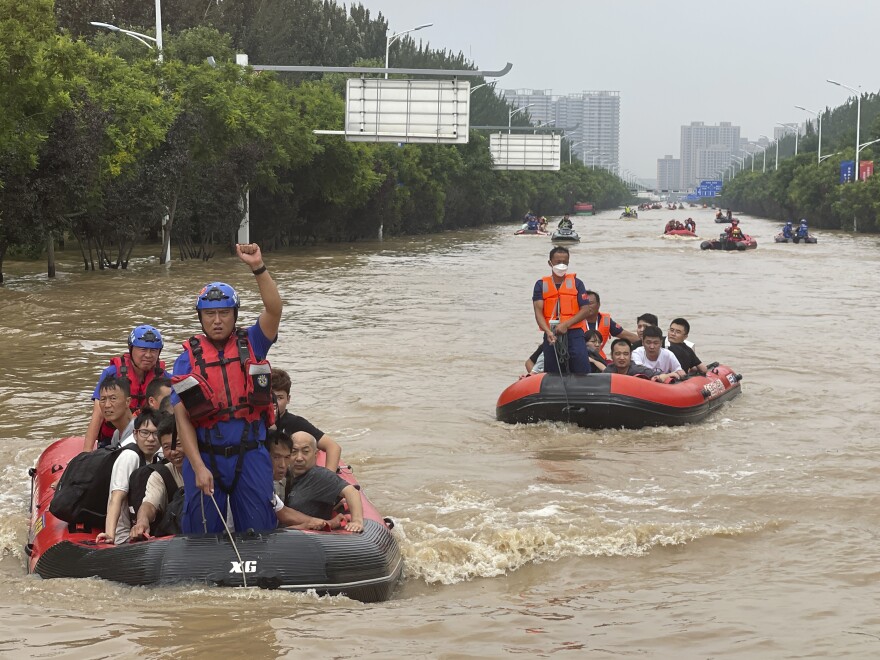BEIJING — Extreme and deadly downpours in Beijing have triggered landslides and floods that swept away cars, destroyed houses and left at least 20 people dead, as the remnants of Typhoon Doksuri unleashed record-high rainfalls over parts of northern China.
The maximum precipitation recorded during the rainfall in the Chinese capital between Saturday and Wednesday morning reached nearly 30 inches, according to the city's meteorological service — a 140-year high.
The torrential rains caught residents unprepared. Parents of a 10-year-old girl told Beijing Time, an online video outlet, that their daughter has been missing since July 31, when floodwaters swept away their house in Mentougou district, a mountainous area located in the west suburb of Beijing that has been hit hardest by the rain.
Eleven people were killed during the rainfall in the capital and another nine died in the neighboring Hebei province, according to the state news agency. Hundreds of thousands have been evacuated to safer places.
Thousands of train passengers have been stranded on the outskirts of Beijing, some stuck for more than 48 hours without food. Among them is a group of children who were coming to Beijing for a summer camp.
"Who would think that Beijing can be hammered by heavy rainfalls?" a parent anxiously awaiting news of their child told The Beijing News.
China's north is usually dry and rarely sees extreme rain.
The Beijing News reported that train passengers were evacuated to nearby villages, where residents provided them with food and water as they waited for rescuers to come.
Beijing's southern outskirts are hardest hit
Bordering Beijing's southern outskirts, Zhuozhou city in Hebei province has been one of the hardest-hit cities in the north of the country, as floodwaters flowed downstream.
Around 9,000 local rescue workers are involved in search and rescue operations in Zhuozhou, with more teams rushing over from neighboring Shanxi and Henan provinces, state media CCTV reported on Wednesday. Hundreds of thousands of residents have been evacuated.
Power cuts and interrupted cell signals caused by flooding have hampered the speed with which local authorities have been able to respond.
Some rescue teams have been waiting for invitation letters from Zhuozhou's authorities before taking any action, as only invited teams can get into the city per Chinese regulations, the newspaper Southern Weekly reported.
A villager, bursting into tears, told Southern Weekly that the official seal needed for the invitation letters was swept away by floodwaters.
Floods hit warehouses and businesses
Floods have also hit warehouses in Zhuozhou city. Hebei serves as a logistic hub for many companies in Beijing. Nearly 100 publishing houses keep their books stocked in Zhuozhou.
BooksChina.com, one of China's oldest online bookstores, said Tuesday night on its WeChat account that its employees were waiting for rescue workers on the fourth floor of their office building. Huang Ping, the founder of BooksChina.com, confirmed Wednesday morning that all of the trapped staff were evacuated to safety. But the books could not be saved.
"It all happened too quickly and we didn't have enough resources to save the books," Huang said, estimating that 70% of the 4 million books in their inventory were damaged by floodwaters.
"As a small company that has meager profits, we haven't recovered from the difficulties. We managed to get through during the pandemic, and we encountered this disaster," the company said on its WeChat account. "It's like another snowstorm after a heavy snow when the ice is still frozen. It's more than rubbing salt on the wound."
Copyright 2023 NPR. To see more, visit https://www.npr.org.



